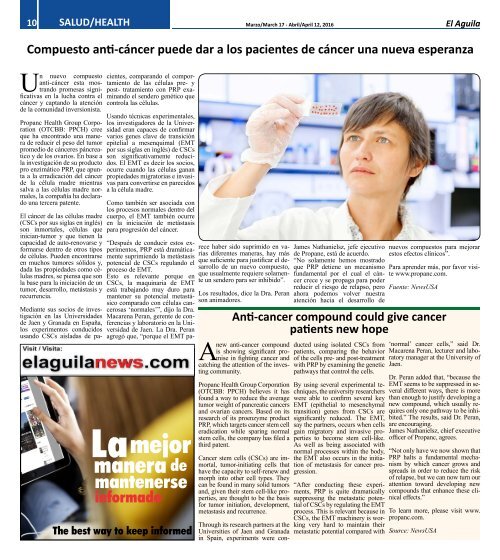El Aguila Magazine – March 16, 2016
You also want an ePaper? Increase the reach of your titles
YUMPU automatically turns print PDFs into web optimized ePapers that Google loves.
10<br />
SALUD/HEALTH<br />
Marzo/<strong>March</strong> 17 - Abril/April 12, 20<strong>16</strong> <strong>El</strong> <strong>Aguila</strong><br />
Compuesto anti-cáncer puede dar a los pacientes de cáncer una nueva esperanza<br />
Un nuevo compuesto<br />
anti-cáncer esta mostrando<br />
promesas significativas<br />
en la lucha contra el<br />
cáncer y captando la atención<br />
de la comunidad inversionista.<br />
Propanc Health Group Corporation<br />
(OTCBB: PPCH) cree<br />
que ha encontrado una manera<br />
de reducir el peso del tumor<br />
promedio de cánceres páncreatico<br />
y de los ovarios. En base a<br />
la investigación de su producto<br />
pro enzimático PRP, que apunta<br />
a la erradicación del cáncer<br />
de la célula madre mientras<br />
salva a las células madre normales,<br />
la compañía ha declarado<br />
una tercera patente.<br />
<strong>El</strong> cáncer de las células madre<br />
(CSCs por sus siglas en inglés)<br />
son inmortales, células que<br />
inician-tumor y que tienen la<br />
capacidad de auto-renovarse y<br />
formarse dentro de otros tipos<br />
de células. Pueden encontrarse<br />
en muchos tumores sólidos y,<br />
dada las propiedades como células<br />
madres, se piensa que son<br />
la base para la iniciación de un<br />
tumor, desarrollo, Visit/Visita: metástasis y<br />
recurrencia.<br />
Mediante sus socios de investigación<br />
en las Universidades<br />
de Jaen y Granada en España,<br />
los experimentos conducidos<br />
usando CSCs aisladas de pa-<br />
cientes, comparando el comportamiento<br />
de las células pre- y<br />
post- tratamiento con PRP examinando<br />
el sendero genético que<br />
controla las células.<br />
Usando técnicas experimentales,<br />
los investigadores de la Universidad<br />
eran capaces de confirmar<br />
varios genes clave de transición<br />
epitelial a mesenquimal (EMT<br />
por sus siglas en inglés) de CSCs<br />
son significativamente reducidos.<br />
<strong>El</strong> EMT es decir los socios,<br />
ocurre cuando las células ganan<br />
propiedades migratorias e invasivas<br />
para convertirse en parecidos<br />
a la célula madre.<br />
Como también ser asociada con<br />
los procesos normales dentro del<br />
cuerpo, el EMT también ocurre<br />
en la iniciación de metástasis<br />
para progresión del cáncer.<br />
La<br />
mejor<br />
manera<br />
de<br />
mantenerse<br />
informado<br />
The best way to keep informed<br />
“Después de conducir estos experimentos,<br />
PRP está dramáticamente<br />
suprimiendo la metástasis<br />
potencial de CSCs regulando el<br />
proceso de EMT.<br />
Esto es relevante porque en<br />
CSCs, la maquinaria de EMT<br />
está trabajando muy duro para<br />
mantener su potencial metastásico<br />
comparado con células cancerosas<br />
‘normales’”, dijo la Dra.<br />
Macarena Peran, gerente de conferencias<br />
y laboratorio en la Universidad<br />
de Jaen. La Dra. Peran<br />
agregó que, “porque el EMT parece<br />
haber sido suprimido en varias<br />
diferentes maneras, hay más<br />
que suficiente para justificar el desarrollo<br />
de un nuevo compuesto,<br />
que usualmente requiere solamente<br />
un sendero para ser inhibido”.<br />
Los resultados, dice la Dra. Peran<br />
son animadores.<br />
Anti-cancer compound could give cancer<br />
patients new hope<br />
A<br />
new anti-cancer compound<br />
is showing significant promise<br />
in fighting cancer and<br />
catching the attention of the investing<br />
community.<br />
Propanc Health Group Corporation<br />
(OTCBB: PPCH) believes it has<br />
found a way to reduce the average<br />
tumor weight of pancreatic cancers<br />
and ovarian cancers. Based on its<br />
research of its proenzyme product<br />
PRP, which targets cancer stem cell<br />
eradication while sparing normal<br />
stem cells, the company has filed a<br />
third patent.<br />
Cancer stem cells (CSCs) are immortal,<br />
tumor-initiating cells that<br />
have the capacity to self-renew and<br />
morph into other cell types. They<br />
can be found in many solid tumors<br />
and, given their stem cell-like properties,<br />
are thought to be the basis<br />
for tumor initiation, development,<br />
metastasis and recurrence.<br />
James Nathanielsz, jefe ejecutivo<br />
de Propane, está de acuerdo.<br />
“No solamente hemos mostrado<br />
que PRP detiene un mecanismo<br />
fundamental por el cual el cáncer<br />
crece y se propaga para poder<br />
reducir el riesgo de relapso, pero<br />
ahora podemos volver nuestra<br />
atención hacia el desarrollo de<br />
Through its research partners at the<br />
Universities of Jaen and Granada<br />
in Spain, experiments were conducted<br />
using isolated CSCs from<br />
patients, comparing the behavior<br />
of the cells pre- and post-treatment<br />
with PRP by examining the genetic<br />
pathways that control the cells.<br />
By using several experimental techniques,<br />
the university researchers<br />
were able to confirm several key<br />
EMT (epithelial to mesenchymal<br />
transition) genes from CSCs are<br />
significantly reduced. The EMT,<br />
say the partners, occurs when cells<br />
gain migratory and invasive properties<br />
to become stem cell-like.<br />
As well as being associated with<br />
normal processes within the body,<br />
the EMT also occurs in the initiation<br />
of metastasis for cancer progression.<br />
“After conducting these experiments,<br />
PRP is quite dramatically<br />
suppressing the metastatic potential<br />
of CSCs by regulating the EMT<br />
process. This is relevant because in<br />
CSCs, the EMT machinery is working<br />
very hard to maintain their<br />
metastatic potential compared with<br />
nuevos compuestos para mejorar<br />
estos efectos clínicos”.<br />
Para aprender más, por favor visite<br />
www.propanc.com.<br />
Fuente: NewsUSA<br />
‘normal’ cancer cells,” said Dr.<br />
Macarena Peran, lecturer and laboratory<br />
manager at the University of<br />
Jaen.<br />
Dr. Peran added that, “because the<br />
EMT seems to be suppressed in several<br />
different ways, there is more<br />
than enough to justify developing a<br />
new compound, which usually requires<br />
only one pathway to be inhibited.”<br />
The results, said Dr. Peran,<br />
are encouraging.<br />
James Nathanielsz, chief executive<br />
officer of Propanc, agrees.<br />
“Not only have we now shown that<br />
PRP halts a fundamental mechanism<br />
by which cancer grows and<br />
spreads in order to reduce the risk<br />
of relapse, but we can now turn our<br />
attention toward developing new<br />
compounds that enhance these clinical<br />
effects.”<br />
To learn more, please visit www.<br />
propanc.com.<br />
Source: NewsUSA
















